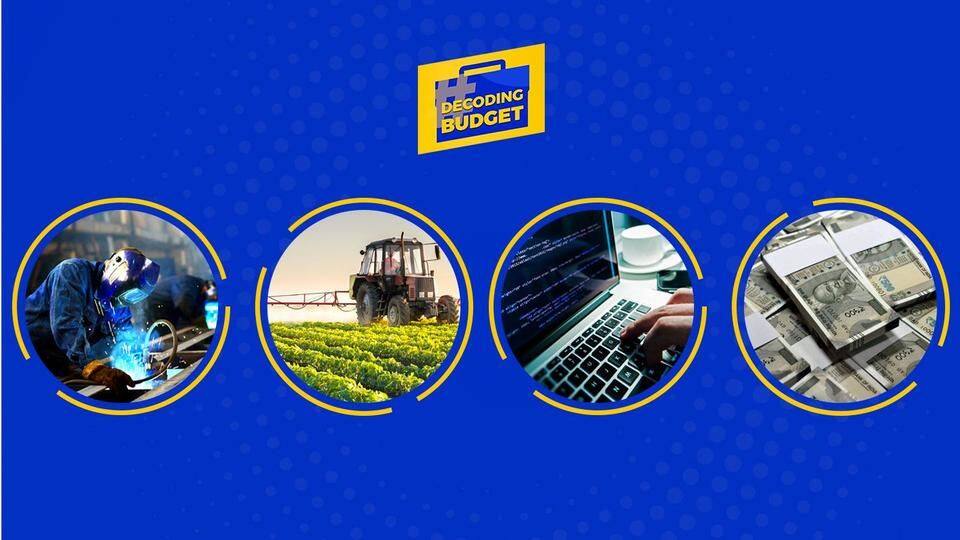
#DecodingBudget: Who are the biggest winners and losers this time?
What's the story
Finance Minister Arun Jaitley has delivered the crucial Budget 2018, which is the last full-fledged Budget for the incumbent Modi-led government before 2019 Lok Sabha elections.
As expected, it was focused on India's "distressed farmers" and rural areas. While the farm sector emerged as the clear winner, consumers, global tech companies, and defense sector are among losers.
Here's a list of the winners and losers.
Farmers
#Winner: Jaitley made huge announcements for farmers
To address farmers' issues, Jaitley made some big announcements, like extending Kisan Credit Cards to fisheries and animal husbandry farmers.
MSP (Minimum Support Price) of kharif crops would be hiked 1.5 times the production cost.
He allocated Rs. 2,000cr for developing/upgrading agricultural marketing infrastructure in 22,000 Grameen Agri Markets and 585 APMCs.
Funds for rural development, irrigation projects, and aquaculture projects were also allocated.
Healthcare companies
#Winner: Government's national insurance scheme to benefit healthcare providers
Healthcare providers could benefit from the announcement of the government's "National Health Protection Scheme", a flagship health insurance program.
Arun Jaitley said that the government has allocated Rs. 1,200cr for the health insurance scheme for over 50 crore poor people.
These people would be insured for up to Rs. 5L per year; healthcare companies and hospitals in the country could gain big from this.
Details
#Winner: Focus on infrastructure could help transport companies, airports
Arun Jaitey said the government would increase infrastructure spending for better roads and Railways. This could prove beneficial for engineering firms, construction companies, train wagon makers, and other transport-related companies, including Larsen & Toubro, Hindustan Construction, and Titagarh Wagons.
Also, the Finance Minister has promised that the government would expand the construction of regional airports, which could benefit airport infra companies.
Information
#Winner: Jewelers could gain from increased rural income
Experts say jewelers could benefit from this Budget as it aims to boost the incomes of rural people and farmers. Rural India accounts for as much as 60% of the country's total gold demand; so, a hike in rural income could be advantageous for jewelers.
Tech Companies
#Loser: Global tech-companies like Apple, Samsung could be biggest losers
This Budget increased customs duty on mobile phones to 20% from 15%. This would have a negative-impact on the returns for smartphone makers, including giants like Apple and Samsung, in India, which is among the biggest and fastest-growing smartphone markets in the world.
This move is aimed at forcing global companies to manufacture devices in India, giving a push to "Make in India" initiative.
Defense Sector
#Loser: No significant announcements made for defense sector
Jaitley said the government would develop connectivity infrastructure in India's border areas to secure defense forces. However, there were no major announcements to boost defense spending to improve the forces' capabilities.
Even over the last three budgets, there was reportedly a decline of 9% in the budget allocation for capital investments against requirements or projections, which may delay procurement and modernization of the forces.
Consumers
#Loser: Consumers to pay more for almost every product, service
The government has increased the customs duty and also the health and educational cess (from 3% to 4%) to fund its flagship healthcare scheme.
However, this decision would have a negative impact on the consumers as it means that they need to pay more for almost all products and services, as the hike in health and educational cess would make them slightly expensive.
Information
#Loser: Why is the financial sector a loser this time?
Jaitley announced that the government has decided to impose a 10% long-term capital gains tax (LCGT) on equity investments (for long-term capital gains exceeding Rs. 1 lakh). This could affect the "investor sentiment" for companies offering financial services, mutual funds, etc.